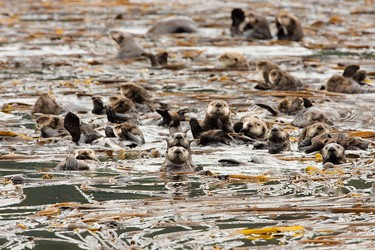Sea Otters Found to Help Combat Global Warming

Sea otters help reduce carbon-dioxide in the atmosphere by making sea kelp thrive, researchers from the University of California Santa Cruz have found. The otters consume the sea urchins, thereby allowing kelp forests to grow.
Kelp is seaweed that absorbs as much as 12 times the amount of CO2 from the atmosphere.
"It is significant because it shows that animals can have a big influence on the carbon cycle," said Chris Wilmers, assistant professor of environmental studies at the University of California Santa Cruz.
The discovery was made while analysing the data on otters and kelp bloom. Researchers have been studying otters and kelp bloom from Vancouver Island to the western edge of Alaska's Aleutian Islands for the past 40 years.
Researchers had analysed kelp density with otters and kelp density without otters. Their study found that sea otters have a positive indirect impact on kelp biomass by preying on sea urchins, which are kelp grazers. When otters are around, sea urchins hide in crevices and eat kelp scraps. When otters are not around, sea urchins graze voraciously on living kelp.
Researchers claim that otters help the kelps to grow, which has a strong influence on the cycle of CO2 storage. Kelp is particularly efficient at sequestering CO2 from the atmosphere through photosynthesis.
Over the past few decades, carbon di-oxide has drastically increased in the atmosphere, which is in turn causing global temperatures to rise.
Wilmers claims that a spreading otter population will not solve the problem of higher CO2 in the atmosphere but argues that the restoration and protection of otters is an example how managing animal populations can affect ecosystems' abilities to sequester carbon.
"Right now, all the climate change models and proposed methods of sequestering carbon ignore animals. But animals the world over, working in different ways to influence the carbon cycle, might actually have a large impact," Wilmers said.
"If ecologists can get a better handle on what these impacts are, there might be opportunities for win-win conservation scenarios, whereby animal species are protected or enhanced, and carbon gets sequestered."
© Copyright IBTimes 2025. All rights reserved.





















